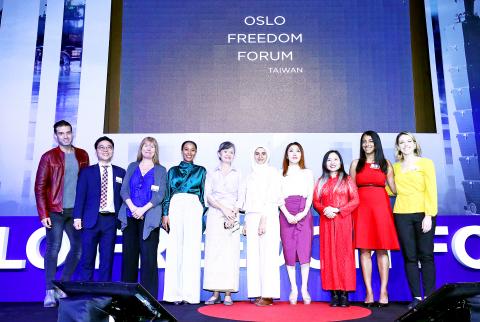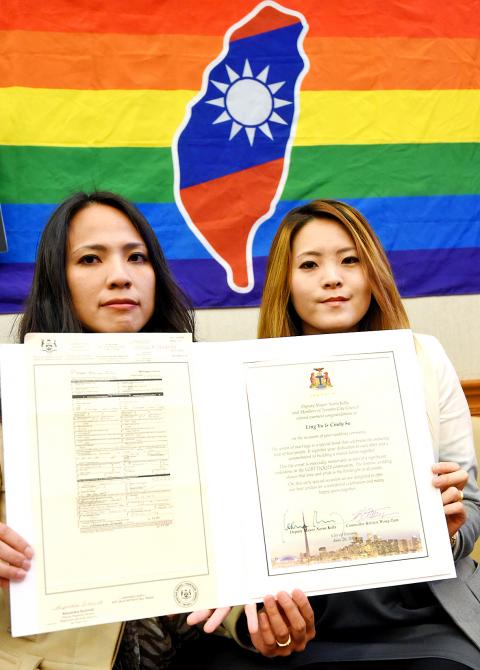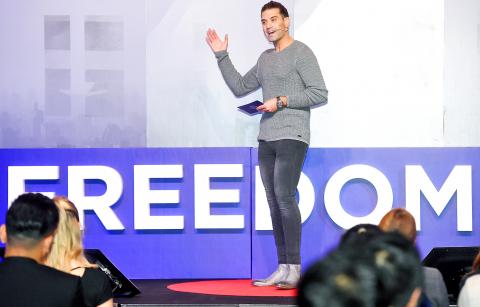Omar Sharif Jr doesn’t agree with the upcoming marriage equality referendums in Taiwan.
“I never believe in the majority being able to vote on the human rights of a minority,” the Egyptian actor, model and LGBTQ activist says. “That doesn’t seem fair.”
Sharif says these decisions should happen top down from the legislature or the judiciary — which did happen in Taiwan before the referendums sprung up — and also from the bottom up with civil engagement.

Photo: Liao Chen-huei, Taipei Times
“There has to be an education component. You can’t legislate acceptance. You can only legislate equality. They have to go hand in hand, and it feels like one really preceded the other here,” he says.
The Taipei Times sat down with Sharif during Saturday’s Oslo Freedom Forum in Taiwan after he shared his story of becoming the first public personality to ever come out, in 2012, as openly gay in the Arab world. He also hosted a luncheon workshop with Cindy Su (蘇珊), CEO of the Lobby Alliance for LGBT Human Rights, where they discussed Taiwan’s current situation and fielded questions from attendees from around the world.
MARGINALIZED NATION

Photo: Liao Chen-huei, Taipei Times
Taiwan’s situation is light years ahead of Egypt, where homosexuality is legal but the government has been cracking down on the LGBTQ community through anti-debauchery laws. Sharif grew up in the spotlight as “Egypt’s favorite son,” the grandson of legendary film icon Omar Sharif.
“Growing up a Sharif in Egypt is almost like being born a Kennedy,” he says.
Sharif left the country after coming out as both gay and half-Jewish in 2012, shortly after the election of Islamist president Mohamed Morsi. He received a torrent of hateful messages and death threats, but also many letters of support — but he ultimately decided to leave the country for Canada.

Photo: Liao Chen-huei, Taipei Times
Sharif knew about the pro and anti-marriage equality referendums before arriving, but says he was shocked to learn that Taiwan only has official diplomatic ties with 17 countries.
“Almost every Taiwanese knows what it feels like to be marginalized by the family of nations out there,” he says. “I don’t know why you would do that inwardly to your own citizens. You tell [LGBTQ] people that they’ll have a different set of laws … that’s sort of what the world is doing to you. How hurtful is that?”
After speaking to forum participants and other people in Taiwan, Sharif believes that despite the setbacks, Taiwan will eventually succeed in its quest for LGBTQ equality.
“While you are struggling now, you are taking huge strides,” he says. “In every progressive movement in the world, sometimes you take two steps forward and one step back. I’m optimistic, because when I listen to other people talk here, I see how entrenched democratic values are and what a source of pride it is for Taiwanese.”
ACCEPTANCE EDUCATION
In his travels to share his story and advocate for LGBTQ rights, Sharif says he’s always surprised how often marriage equality is seen as the “pinnacle of LGBTQ equality” when to him, it’s just the beginning.
“So long as people are being bullied in school, made homeless, thrown out of their families… as long as there are hate crimes, as long as trans women are the number one demographic likely to be subject to violence … what does it mean that we can get married?” he says. “It’s an amazing thing to strive for, but there’s so much work to do after that.”
He repeatedly stresses that acceptance cannot be legislated, and education from a young age is the only way to change people’s mindsets. In Taiwan, whether LGBTQ issues should be included in gender equity education is one of the items anti-marriage equality groups have placed on the referendum. Sharif says education should begin as early as possible.
“Education won’t change anyone’s opinions on who they are and who they’re going to love, but it can create more safe spaces for people to be who they actually are,” he says. “We don’t need to be talking about sexualized things, just about difference in human beings. The same way we teach people to love our handicapped neighbors, people with different ethnic identities…”
Outside of the classroom, however, sharing stories will help to bring about positive. For example, he says the US has been fairly successful because people have been sharing stories with friends and loved ones since the first National Coming Out Day in 1988.
“All of a sudden, people weren’t just facts, figures, statistics, moral and ethical debates,” he says. “They were your brothers, your sisters, your coworkers, people you knew. Everyone knows someone who will be affected by this law. At the end of the day, if you know someone is being hurt, and you know that person, can you allow for it?”
Despite his tireless advocacy, Sharif admits that he’s growing tired of telling the same story over and over again. But nobody has been able to take up the mantle as the situation in the Middle East is not improving. He can count at most three public figures that have revealed their homosexuality.
“I think all activism needs new blood and new stories,” he says. “But too few people come out in the Middle East because it’s difficult and outright dangerous. Until they do, I’ll keep doing it.”

Growing up in a rural, religious community in western Canada, Kyle McCarthy loved hockey, but once he came out at 19, he quit, convinced being openly gay and an active player was untenable. So the 32-year-old says he is “very surprised” by the runaway success of Heated Rivalry, a Canadian-made series about the romance between two closeted gay players in a sport that has historically made gay men feel unwelcome. Ben Baby, the 43-year-old commissioner of the Toronto Gay Hockey Association (TGHA), calls the success of the show — which has catapulted its young lead actors to stardom -- “shocking,” and says

The 2018 nine-in-one local elections were a wild ride that no one saw coming. Entering that year, the Chinese Nationalist Party (KMT) was demoralized and in disarray — and fearing an existential crisis. By the end of the year, the party was riding high and swept most of the country in a landslide, including toppling the Democratic Progressive Party (DPP) in their Kaohsiung stronghold. Could something like that happen again on the DPP side in this year’s nine-in-one elections? The short answer is not exactly; the conditions were very specific. However, it does illustrate how swiftly every assumption early in an

Inside an ordinary-looking townhouse on a narrow road in central Kaohsiung, Tsai A-li (蔡阿李) raised her three children alone for 15 years. As far as the children knew, their father was away working in the US. They were kept in the dark for as long as possible by their mother, for the truth was perhaps too sad and unjust for their young minds to bear. The family home of White Terror victim Ko Chi-hua (柯旗化) is now open to the public. Admission is free and it is just a short walk from the Kaohsiung train station. Walk two blocks south along Jhongshan

Francis William White, an Englishman who late in the 1860s served as Commissioner of the Imperial Customs Service in Tainan, published the tale of a jaunt he took one winter in 1868: A visit to the interior of south Formosa (1870). White’s journey took him into the mountains, where he mused on the difficult terrain and the ease with which his little group could be ambushed in the crags and dense vegetation. At one point he stays at the house of a local near a stream on the border of indigenous territory: “Their matchlocks, which were kept in excellent order,